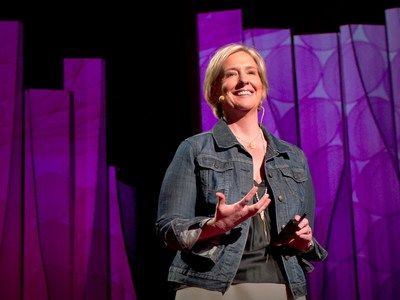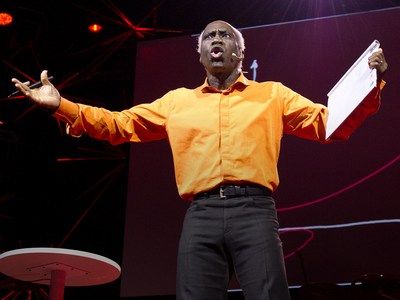The BEST episodes of TED Talks season 2012
Every episode of TED Talks season 2012, ranked from best to worst by thousands of votes from fans of the show. The best episodes of TED Talks season 2012!
TED is a nonprofit devoted to Ideas Worth Spreading. It started out (in 1984) as a conference bringing together people from three worlds: Technology, Entertainment, Design. TEDTalks began as a simple attempt to share what happens at TED with the world. Under the moniker "ideas worth spreading," talks were released online. They rapidly attracted a global audience in the millions. Indeed, the reaction was so enthusiastic that the entire TED website has been reengineered around TEDTalks, with the goal of giving everyone on-demand access to the world's most inspiring voices. [TED-Ed and TEDx are separate TVDB series and should NOT be listed here. Episode ordering and dates are sourced from YouTube.]

#1 - Brené Brown: Listening to shame
Season 2012 - Episode 12 - Aired 3/16/2012
Shame is an unspoken epidemic, the secret behind many forms of broken behavior. Brené Brown, whose earlier talk on vulnerability became a viral hit, explores what can happen when people confront their shame head-on. Her own humor, humanity and vulnerability shine through every word.
Watch Now:Amazon#2 - Bryan Stevenson: We need to talk about an injustice
Season 2012 - Episode 5 - Aired 3/5/2012
In an engaging and personal talk -- with cameo appearances from his grandmother and Rosa Parks -- human rights lawyer Bryan Stevenson shares some hard truths about America's justice system, starting with a massive imbalance along racial lines: a third of the country's black male population has been incarcerated at some point in their lives. These issues, which are wrapped up in America's unexamined history, are rarely talked about with this level of candor, insight and persuasiveness.
Watch Now:Amazon#3 - Ronny Edry: Israel and Iran: A love story?
Season 2012 - Episode 142 - Aired 9/1/2012
When war between Israel and Iran seemed imminent, Israeli graphic designer Ronny Edry shared a poster on Facebook of himself and his daughter with a bold message: "Iranians ... we [heart] you." Other Israelis quickly created their own posters with the same message — and Iranians responded in kind. The simple act of communication inspired surprising Facebook communities like "Israel loves Iran," "Iran loves Israel" and even "Palestine loves Israel."
#4 - Daphne Bavelier: Your brain on video games
Season 2012 - Episode 118 - Aired 6/1/2012
How do fast-paced video games affect the brain? Step into the lab with cognitive researcher Daphne Bavelier to hear surprising news about how video games, even action-packed shooter games, can help us learn, focus and, fascinatingly, multitask.
Watch Now:Amazon#5 - Amy Cuddy: Your body language shapes who you are
Season 2012 - Episode 83 - Aired 6/28/2012
#6 - Joshua Foer: Feats of memory anyone can do
Season 2012 - Episode 39 - Aired 5/10/2012
There are people who can quickly memorize lists of thousands of numbers, the order of all the cards in a deck (or ten!), and much more. Science writer Joshua Foer describes the technique -- called the memory palace -- and shows off its most remarkable feature: anyone can learn how to use it, including him.
#7 - Reggie Watts disorients you in the most entertaining way
Season 2012 - Episode 48 - Aired 5/25/2012
Reggie Watts' beats defy boxes. Unplug your logic board and watch as he blends poetry and crosses musical genres in this larger-than-life performance.
#8 - Wade Davis: Gorgeous photos of a backyard wilderness worth saving
Season 2012 - Episode 65 - Aired 2/26/2013
Ethnographer Wade Davis explores hidden places in the wider world -- but in this powerful short talk he urges us to save a paradise in his backyard, Northern Canada. The Sacred Headwaters, remote and pristine, are under threat because they hide rich tar sands. With stunning photos, Davis asks a tough question: How can we balance society's need for fuels with the urge to protect such glorious wilderness?

#9 - Eddie Obeng: Smart failure for a fast-changing world
Season 2012 - Episode 93 - Aired 6/1/2012
The world is changing much more rapidly than most people realize, says business educator Eddie Obeng — and creative output cannot keep up. In this spirited talk, he highlights three important changes we should understand for better productivity, and calls for a stronger culture of “smart failure."
#10 - Jake Wood: A new mission for veterans -- disaster relief
Season 2012 - Episode 109 - Aired 12/1/2011
After fighting overseas, 92 percent of American veterans say they want to continue their service. Meanwhile, one after another, natural disasters continue to wreak havoc worldwide. What do these two challenges have in common? In telling the story of his friend Clay Hunt, Jake Wood from Team Rubicon reveals how veterans can contribute to disaster response — and regain their sense of purpose, community and self-worth..
#11 - John Wilbanks: Let's pool our medical data
Season 2012 - Episode 94 - Aired 6/1/2012
When you're getting medical treatment, or taking part in medical testing, privacy is important; strict laws limit what researchers can see and know about you. But what if your medical data could be used — anonymously — by anyone seeking to test a hypothesis? John Wilbanks wonders if the desire to protect our privacy is slowing research, and if opening up medical data could lead to a wave of health care innovation.
#12 - Beau Lotto + Amy O'Toole: Science is for everyone, kids included
Season 2012 - Episode 95 - Aired 10/17/2012
#13 - Heather Brooke: My battle to expose government corruption
Season 2012 - Episode 96 - Aired 6/1/2012
Our leaders need to be held accountable, says journalist Heather Brooke. And she should know: Brooke uncovered the British Parliamentary financial expenses that led to a major political scandal in 2009. She urges us to ask our leaders questions through platforms like Freedom of Information requests — and to finally get some answers.
#14 - Ryan Merkley: Online video -- annotated, remixed and popped
Season 2012 - Episode 97 - Aired 6/1/2012
Videos on the web should work like the web itself: dynamic, full of links, maps and information that can be edited and updated live, says Ryan Merkley. On the TED stage he demos Mozilla's Popcorn Maker, a web-based tool for easy video remixing.
#15 - Pankaj Ghemawat: Actually, the world isn't flat
Season 2012 - Episode 98 - Aired 6/1/2012
It may seem that we're living in a borderless world where ideas, goods and people flow freely from nation to nation. We're not even close, says Pankaj Ghemawat. With great data (and an eye-opening survey), he argues that there's a delta between perception and reality in a world that's maybe not so hyperconnected after all.
#16 - David Pizarro: The strange politics of disgust
Season 2012 - Episode 99 - Aired 5/1/2012
What does a disgusting image have to do with how you vote? Equipped with surveys and experiments, psychologist David Pizarro demonstrates a correlation between your sensitivity to disgusting cues — a photo of feces, an unpleasant odor — and your own moral or political conservatism.
#17 - Lemn Sissay: A child of the state
Season 2012 - Episode 100 - Aired 6/1/2012
Literature has long been fascinated with fostered, adopted and orphaned children, from Moses to Cinderella to Oliver Twist to Harry Potter. So why do many parentless children feel compelled to hide their pasts? Poet and playwright Lemn Sissay tells his own moving story.
#18 - Doris Kim Sung: Metal that breathes
Season 2012 - Episode 101 - Aired 5/1/2012
Modern buildings with floor-to-ceiling windows give spectacular views, but they require a lot of energy to cool. Doris Kim Sung works with thermo-bimetals, smart materials that act more like human skin, dynamically and responsively, and can shade a room from sun and self-ventilate.
#19 - Marco Tempest: A cyber-magic card trick like no other
Season 2012 - Episode 102 - Aired 6/1/2012
The suits, numbers and colors in a deck of cards correspond to the seasons, moon cycles and calendar. Marco Tempest straps on augmented reality goggles and does a card trick like you’ve never seen before, weaving a lyrical tale as he deals. (This version fixes a glitch in the original performance, but is otherwise exactly as seen live by the TEDGlobal audience, including the dazzling augmented reality effects.)
#20 - Rory Stewart: Why democracy matters
Season 2012 - Episode 103 - Aired 6/1/2012
The public is losing faith in democracy, says British MP Rory Stewart. Iraq and Afghanistan’s new democracies are deeply corrupt; meanwhile, 84 percent of people in Britain say politics is broken. In this important talk, Stewart sounds a call to action to rebuild democracy, starting with recognizing why democracy is important — not as a tool, but as an ideal.
#21 - Sanjay Pradhan: How open data is changing international aid
Season 2012 - Episode 104 - Aired 6/1/2012
How do we make sure that development and aid money actually goes to the people who most need it? Sanjay Pradhan of the World Bank Institute lays out three guidelines to help relief efforts make the most impact — while curbing corruption. One key: connecting the players who are working to change broken systems with the data they need.
#22 - Emma Teeling: The secret of the bat genome
Season 2012 - Episode 105 - Aired 9/1/2012
In Western society, bats are often characterized as creepy, even evil. Zoologist Emma Teeling encourages us to rethink common attitudes toward bats, whose unique and fascinating biology gives us insight into our own genetic makeup.
#23 - Adam Garone: Healthier men, one moustache at a time
Season 2012 - Episode 106 - Aired 11/1/2011
Adam Garone has an impressive moustache, and it's for a good cause. A co-founder of Movember, Garone's initiative to raise awareness for men's health — by having men grow out their moustaches every November — began as a dare in a bar in 2003. Now, it's a worldwide movement that raised $126 million for prostate cancer research last year.
#24 - Faith Jegede: What I've learned from my autistic brothers
Season 2012 - Episode 107 - Aired 4/1/2012
Faith Jegede tells the moving and funny story of growing up with her two brothers, both autistic — and both extraordinary. In this talk from the TED Talent Search, she reminds us to pursue a life beyond what is normal.
#25 - Matt Killingsworth: Want to be happier? Stay in the moment
Season 2012 - Episode 108 - Aired 11/5/2012
When are humans most happy? To gather data on this question, Matt Killingsworth built an app, Track Your Happiness, that let people report their feelings in real time. Among the surprising results: We're often happiest when we're lost in the moment. And the flip side: The more our mind wanders, the less happy we can be.